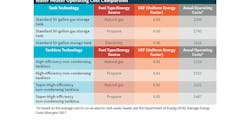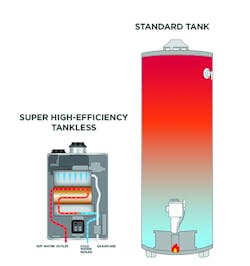Latest from Hydronics Systems
Sponsored
As energy conservation continues to grow in importance, more homeowners and businesses are opting for a tankless water heater over the traditional water heater. Tankless options are growing in popularity as they help bring down energy costs and improve energy efficiency.
To help homeowners and business owners understand where the savings are coming from, it helps to share with them how a tankless unit differs from a traditional tank.
Tank vs. Tankless
A standard hot water tank works by heating and reheating the water it holds to maintain the desired set temperature – regardless of usage or demand. This reheating of the same water causes an additional energy expenditure which brings down the efficiency of the product. Additionally, the storage within the tank is limited, eventually leading homeowners to run out of hot water if they are heavy users.
With a tankless water heater, cold water enters the unit when hot water is needed. The water is then heated, exits the unit and travels to the location where the water is needed. A tankless water heater offers an endless supply of hot water whereas a hot water tank eventually runs out, and it does it all while using considerably less energy.
Efficiency
According to Energy.gov, a household using less than 41 gallons of water a day could see up to 34 percent more energy efficiency by using a tankless water heater. And in researching tankless water heaters, there may be a noticeable price difference between tankless water heaters and standard tank water heaters. According to Energy.gov, tankless water heaters last upwards of 20 years, while standard tank water heaters last half as long. With proper maintenance, the longevity of a tankless water heater might extend even farther.
Take a look at table A below on how the annual operating costs of a traditional tank and Rinnai Tankless Water Heaters compare based on the Department of Energy's (DOE) 2017 findings. As you can see, these specific tankless water heaters consume less energy therefore costing less to operate – not only saving money, but reducing the carbon footprint in the process.
A tankless water heater can reduce a home’s energy bill up to 40%* based on how much hot water is used per day, the home’s layout and other factors. But how? A conventional tank cycles on and off 24 hours a day – whether using hot water or not – to keep its gallons of water warm. A tankless, on the other hand, eliminates storage and heats water only as it’s used.
To find out exactly how much money a tankless can save users, check out the DOE’s Energy Cost Calculator for Electric and Gas Water Heaters.
In addition to the long-term savings a tankless water heater provides, there are a few added benefits that make deciding to go with a tankless water heater a no-brainer:
Capacity
No more cold showers while running the dishwasher or doing laundry. A tankless water heater, when sized and installed properly, emits a continuous and endless stream of hot water at a predetermined temperature, allowing homeowners to get all the hot water they need.
Longevity
A conventional tank lasts, on average, eight to 12 years**. So every 10 years or so, business and homeowners can expect to deal with it leaking, malfunctioning or, not working at all. The life span of a tankless, however, is up to twice as long***. That means they can enjoy additional years of not having to worry about their hot water tank rusting, cracking or leaking.
Home Value
Doubling the lifespan of a water heating system can increase the value of a home as well. That’s right. The installation of a highly efficient tankless unit enables homeowners to raise the asking price and reap a bigger profit when selling.
Versatility
If space is an issue in the home or business (even if it’s not), then a tankless water heater is the perfect option. Units are about 1/5 the size of a bulky storage tank – equivalent to a carry-on suitcase. Plus, it mounts on the wall to save valuable floor space.
A tankless is so compact and offers such flexible venting options, that it can be discreetly installed in numerous places throughout the home – from an attic, garage or basement to a bathroom closet. Some manufacturers even offers exterior models, so units can be easily installed outside the home, too.
Sustainability
Tankless water heaters are a sustainable choice. The tankless technology achieves maximum energy efficiency, helping to conserve natural resources, and higher standards for lower CO2 emissions reduces your carbon footprint. Plus, most units contain recyclable parts which mean less waste in landfills.
Smart Technology
With Wi-Fi connectivity, innovative Rinnai Tankless Water Heaters (2006 and newer) can be remotely monitored and controlled via smart devices, a cool feature that benefits both the homeowners and installers. With systems that have recirculation capability, recirculation can be activated through the use of the Control-R™ Module. The module can be wirelessly paired with motion sensors or push buttons. The enhanced Control-R™ mobile app with Smart Home technology integrates more than 20 voice commands allowing on-demand voice activation of the recirculation system and temperature control. Paring with Amazon Alexa, Google Home and Samsung SmartThings is possible only with Rinnai Tankless Water Heaters.
Going tankless is a big decision. As your customer considers their water heating needs and wants, share with them the vast options and features available on the market. The long-term savings, in addition to the benefits discussed will make the decision to go tankless an easier one and leave them feeling confident in their decision to make the solid investment.
David Federico is an experienced marketer with a history of working in a variety of different industries including the building materials industry. David joined Rinnai America Corporation in May of 2016 and has focused on driving consumer awareness, developing relationships with trade partners, and supporting the growth of the organization’s product portfolio. Federico has Bachelor of Business Administration in Marketing from Georgia State University.
[A quick guide to sizing tankless water heaters from Best Osmosis Systems.]
*Based on average cost to run an electric tank water heater per the Department of Energy (DOE) Average Energy Costs (doe.gov) 2017.
**Based on https://www.lowes.com/projects/repair-and-maintain/when-to-replace-a-water-heater/project
***Based on DOE ENERGY STAR® lifecycle estimates.
David Federico
David Federico is Senior Director of Marketing at Rinnai America Corporation with primary responsibilities leading the marketing strategy for its residential and commercial products. Prior to joining the organization in 2016, David held marketing leadership positions at multinational corporations including Georgia-Pacific. David is a graduate of Georgia State University with a bachelor's degree in Business Administration - Marketing.



